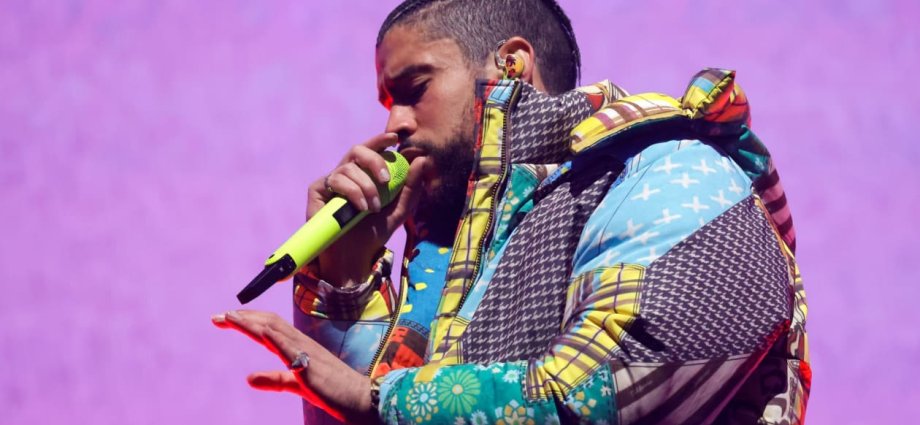Puerto Rican musician Bad Bunny can add another feather to his global stardom cap: his 2022 release “Un Verano Sin Ti” has become Spotify’s most streamed album of all time.
The fourth studio album from the Latin trap and reggaetón phenomenon, it racked up more than 356 million on-demand streams in the first week after its release in May, according to Billboard: the “largest streaming week ever for a Latin music album”.
The singer-songwriter, rapper and producer “dominated several year-end music lists in 2022”, said Forbes, topping the list of most streamed artists on Spotify for the third consecutive year. He’s reached “a new stratosphere of stardom”, said Rolling Stone; he is “virtually everywhere”.
And his “unabashed pride for Latino communities and the Spanish language, defiance of traditional gender norms and push for justice on a range of social issues” makes him a “de-facto political icon”, said The Washington Post.
Who is Bad Bunny?
Benito Antonio Martínez Ocasio, known professionally as Bad Bunny, was born in 1994, to truck driver and teacher parents. He grew up in San Juan, Puerto Rico, the oldest of three brothers, surrounded by traditional Latin music like salsa and merengue. He began composing songs and beats from the age of 13.
A “self-described class clown”, said NPR, he was forced as a child to dress in a bunny rabbit costume. “He was pretty angry about it, but the name stuck.”
Studying at the University of Puerto Rico at Arecibo, he would upload Spanish-language singles to SoundCloud while bagging groceries at night.
Bad Bunny got his big break in the Anglosphere when he collaborated with American rapper Cardi B in 2018 on “I Like It”. The multi-platinum hit “transformed Bad Bunny into a household name”, said Vulture, and “set the stage” for his full-length debut, “X 100pre”.
In less than two years he became “an unequivocal superstar across Latin America and the diaspora”, said The Fader. He was ubiquitous on both Spanish and English-language charts for his collaborations with everyone from Daddy Yankee to Nicki Minaj.
By 2022, he had broken Ed Sheeran’s touring record, grossing $435 million in the year. This year, aged just 29, he became the first Spanish-speaking artist to headline Coachella music festival, a show that referenced Cuban salsa greats, reggaetón predecessors and Puerto Rican icons.
Even controversies – this year, his ex-girlfriend Carliz Hernández sued him for alleged unauthorised use of her voice, and a video emerged of him throwing a fan’s phone into bushes, to widespread criticism – seemingly haven’t dented his astonishing success.
He bought a mansion in the Hollywood Hills for $8.8 million, reported Dirt, and this summer he followed in the footsteps of Michael Jackson and Britney Spears by starring in a Pepsi advert.
He has become a figure of intense cultural scrutiny. America is awash with symposiums and classes dedicated to analysing his influence.
“I never dreamed I wanted to be the biggest one or No. 1,” he told Billboard last year. “I did it because I loved it, and my only dream was to be able to make a living out of it.”
Political significance
Bad Bunny’s refusal to sing in English is “deeply political in itself”, said Foreign Policy. But he is also overtly political, taking stands on everything from LGBT rights to Puerto Rican issues.
With a penchant for painted nails, short shorts, flamboyant outfits and “get-ups that would make David Bowie tip his fedora in admiration”, said NPR, “he boasts about stealing your girl while rocking a gender-bending style”, dressing in drag and kissing a male dancer on stage.
The video for his hit single “El Apagón” (The Blackout) deals with the devastation wrought by Hurricane Maria in 2017, and the struggles the island has faced since. In 2019 he cut his tour short to join Puerto Rican protests against corruption.
“I always say that’s the life of people in Puerto Rico,” he told Rolling Stone. “We love to celebrate and act like nothing matters, then we clash against a reality that is often very painful.”
Puerto Rico is a US territory, “neither a state nor an independent country”, explained History. So “islanders” – despite being US citizens, subject to federal laws – can’t vote in presidential elections, and “lack voting representation in Congress”.
But once Puerto Ricans move “stateside”, they gain the right to vote. The island population has decreased by about 11% in the past decade: an “exodus” to the mainland in search of better economic opportunities. With a population of about 5.8 million, Puerto Ricans now make up the second largest Hispanic group in the continental US, after Mexicans.
So Bad Bunny’s popularity is “of particular resonance to young Puerto Ricans on and off the island”, said The Washington Post. “Boricuas [Puerto Ricans] have taken note – as have members of Congress.”











